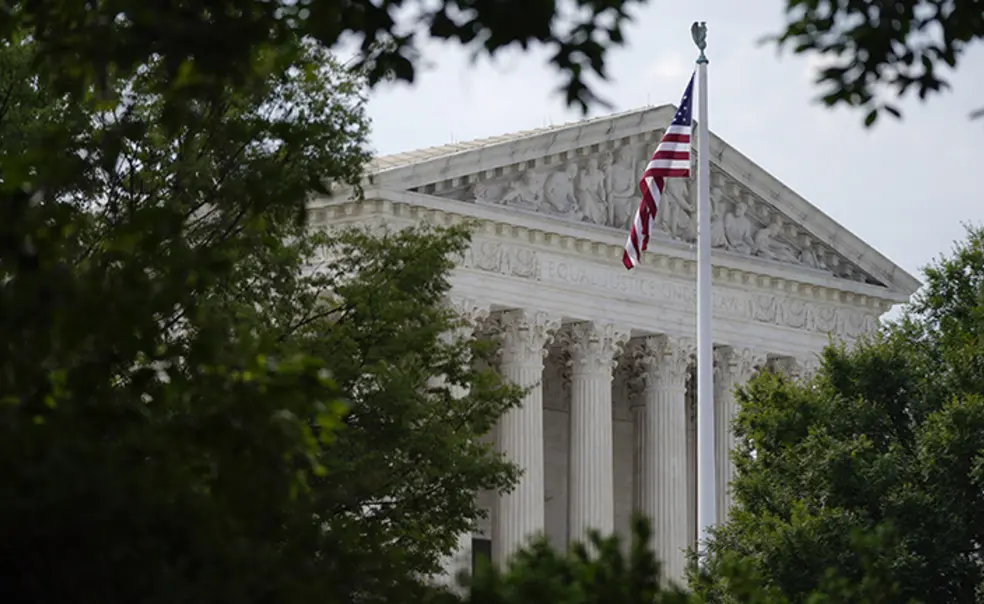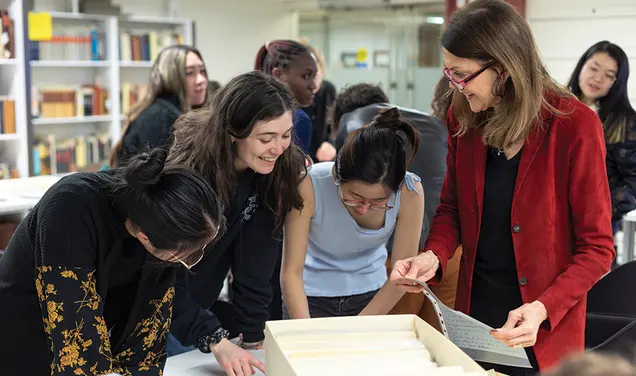With Roe Overturned, Physician Alums Anxious About Women’s Health Care
‘How can I take care of patients when my hands are tied?’
Last week the Supreme Court delivered its ruling on the Dobbs v. Jackson case, overturning Roe v. Wade, the landmark 1973 decision that established the constitutional right to an abortion in the U.S. Now states can decide the legal status of abortion. As of this writing abortion is banned or mostly banned in nine states, will be banned in four more states within a month, and is likely to be banned in seven other states, according to data compiled by The Washington Post. In 20 states and the District of Columbia, abortion is legal and expected to remain so.
PAW reached out to alumni who work in obstetrics and gynecology and asked them to explain what the ruling could mean for women’s health.
The featured alumni voices are individual perspectives and do not represent the alums’ workplaces or organizations. Responses have been lightly edited for length and clarity.
Amanda McPherson ’94
OB/GYN who works in a hospital in Columbus, Georgia
I do not personally perform “elective” abortions, but I am so worried about how the ruling will play out in my state. For example, just last week I had a patient who was hemorrhaging from a first-trimester miscarriage, but the fetus still had a heartbeat. Will I be able to intervene in these types of situations moving forward? Medicine is not black and white. There are too many gray areas with tragically awful decisions to make. OB physicians just want to be able to take care of their patients without the fear of criminal charges for performing evidence-based medicine.
I need to reach out to our elected officials. The American College of Obstetricians and Gynecologists is working on it, but they are scrambling just like the rest of us. I guess I also need to talk to our hospital attorneys and start getting a committee together to address the decisions we will have to face moving forward …
My father is a retired OB/GYN doctor. He is 82 years old and is old enough to remember fatal complications from “home” abortions. I never thought I would have to think about a future like that.
Ugonna Ada Anyanwu ’00
Obstetrics and gynecology specialist who works in a hospital in Greensboro, North Carolina
In my group we are the ones employed by the hospital, so most of our patients are from lower socioeconomic classes. We manage patients who come in after lawful terminations and those who experience complications.
In North Carolina, for now, we do not have any trigger laws, so this ruling does not impact our practice. However, we are worried about what happens to the south of us, where patients may come to us if they have complications.
Everybody is worried. Women are worried. Patients are worried. We do have some terminations that are done especially for multiple fetal anomalies or when the health of the mother is adversely affected, but they still fall under the umbrella of elective terminations, and some people are worried about that.
We’ll just continue to take care of patients. That’s just what we do. We are used to taking care of complications from legal terminations. We have not seen much from illegal terminations, so that’s going to be eye-opening. I just shudder thinking about people using unsafe methods to try and induce abortions at home — you always think about the horror stories involving hangers, etc. I truly hope women don’t do that, but we have to be prepared for anything because desperate women will do desperate and dangerous things.
It is scary. I never thought that this was something I would face in my lifetime. I thought we were done and over with it and had moved on.
Amelia Parrett ’04
OB/GYN at a tertiary care center in Salt Lake City, Utah
I am a relatively committed pro-life obstetrician and gynecologist, and because of that, the care that I provide will not be impacted by the reversal of Roe v. Wade. Anytime I’m caring for a patient who’s pregnant, there are two lives that are truly under my care.
I hope that there will be a recognition that, for a lot of women, there are barriers to motherhood that are within the control of our system to fix, such as increasing access to paid maternity leave, providing better resources for prenatal care specifically, and also for low-cost birth control. That deserves national and states’ attention. The more that I can connect women with social services, support, rent assistance — truly just access points for care — I think the better the situation will be for all.
I hope that this is a way for us to unify on all sides of the conversation about the importance of caring for women and children, and specifically providing better access and better care for people who do not have the same resources as a significant percentage of the population does. I hope that this is a way to eliminate barriers to low-cost birth control and to incredibly straightforward and low-cost, as well as high-quality, prenatal care for women across all walks of life.
Beth Reid ’94
OB/GYN who works at a women’s health clinic in New Braunfels, Texas
In Texas, we are already dealing with a virtual abortion ban because of the “no abortion after six weeks of gestation” rule that has been in place for several months to a year.
Luckily, most people have normal pregnancies and don’t ever have to know about the agonizing decisions some pregnant women and their families have to face. In my practice, it is the women with abnormal pregnancies who will be affected. Ending the ability to provide medically safe abortion is an incredibly detrimental thing in the practice of complicated obstetrics. Having to travel across state lines to have medically needed abortion makes procedures much more dangerous, because every day the fetus grows.
I’ll be speaking out whenever possible and helping my patients get to effective treatment outside of Texas. I have loans to pay off and children to raise, so I won’t be leading the fight against this. The vast majority of practicing obstetricians are women under 45, who are the busiest people in America.
I do feel that ending routine abortion across-the-board will result in more unplanned pregnancies and more unwanted children. When women make the agonizing decision to end a routine pregnancy, they do it not lightly, or flippantly. We should trust women to know what is best for themselves and their families.
Claire Hoppenot ’07
Gynecologic oncologist and assistant professor working at a hospital in Houston, Texas
I moved to Texas three years ago and my husband just got a job here, so we are committed to staying a while more. We had already considered whether we should stay since HB2, the heartbeat bill, went into effect in the last year or so here in Texas, which has already very severely limited access to abortion. We ended up deciding to stay in Texas and hope that we can be part of a change.
I expect this ruling, limiting access to abortion anywhere within a day’s driving distance from Houston (except Mexico, I suppose), will lead to more emergencies, mismanaged spontaneous abortion/miscarriages, women whose health is at risk from pregnancy in general and who end up as emergency cases, loss of fertility due to massive hemorrhage, and loss of women’s lives.
As a trained obstetrician and gynecologist, I know that abortion is critical woman’s health care. There are many medical reasons to have an abortion, whether because the pregnancy is unsafe for a woman’s health or is not viable. Add to that all the personal and social reasons for abortion that women have, and abortion care is good and necessary health care.
It casts a huge shadow over my relationship with patients when I cannot provide or refer to care that I know is right for a patient. How can I take care of patients when my hands are tied? I worry this is just the start when there is so much of women’s health and health care that is under fire.
Carolyn Smith-Lin ’10
Obstetrics and gynecology specialist in Santa Fe, New Mexico
There’s already been an influx of patients here probably for the last four months, from Texas — particularly West Texas.
When I talk to mentors who came through during the time of septic abortions from basically botched abortion care that was not provided in the appropriate settings, the conversations and their motivations for why they provide abortion care are very different. I have to admit, when I started in this field as an undergraduate and in medical school, the way that I thought through and understood arguments for and against reproductive services — specifically abortion care for women to support their autonomy — was very abstract and theoretical. It was very much based on embryology, cell development, and all that from biology classes, as well as discussions in political science fields and ethics.
I really grappled with this initially. Now I align more with the older generation who lived through the septic-abortion stage. I have seen enough maternal mortality, and enough women who have had near misses, who very well could have died from their pregnancies. There are many, many women who had very desired pregnancies and had to make difficult choices on the level of: “Do I want to live to take care of my kids who are alive right now, or do I want to potentially die by trying to continue this pregnancy?” As someone who has lost patients, it’s not abstract.










3 Responses
Wayne S. Moss ’74
3 Years AgoDobbs and Princeton
I’m no fan of abortion but no fan of suicide either. I am shocked and disappointed that an academically distinguished alumnus of this great university has now played a leading role in the Dobbs decision which, inter alia, will lead to many mentally ill women committing suicide because they will never be able to persuade a legislature that their medical necessity for abortion is their mental illness. As a human being, I am truly hurt and offended by the callousness and intellectual arrogance which allows this result to happen without even a word of recognition. Princeton is better than this, but it’s a shame that some of our individual colleagues are not. What can be done about the prized Princeton education and culture so that there is greater sensitivity to our most marginalized fellow citizens? How can it be that the voice of such heartlessness and inevitable carnage is one of our own?
Norman Ravitch *62
3 Years AgoGrads of Excellent Schools Can Do Bad Things
I am shocked that anyone can be shocked that Princetonians are capable of evil decisions and behaviors. Historians know that among the most embittered Nazi Germans were university students and faculty members in the years before and especially after WWI.
If we paid more attention to Weimar Germany we would be better at preventing Weimar America!
Steven M. Wilk ’75
3 Years AgoConsequences of the Supreme Court’s Decision
Thank you for sharing the thoughts of a few of the OB/GYN alums regarding this extremely difficult topic. As a family physician for 40 years who delivered babies early in my career, I too fear the consequences of the Supreme Court’s decision, some of which are already occurring in states with very restrictive abortion laws. An example of this was recently cited in our local newspaper, the Indianapolis Star, which wrote of a 10-year-old girl who was being referred from an Ohio obstetrician to a colleague in Indiana, because her pregnancy was at 6 weeks and 3 days, just outside the 6-week restriction for an elective abortion in Ohio. The Indiana legislature is meeting in special session later this month and will likely be added to the states with restricted abortion access. The Supreme Court’s statement that this should be decided at the state level has only added to the confusion and anxiety for women who need to make an extremely difficult decision about ending their pregnancy, even if it is in their own medical best interest. It is unfortunate this issue is so politicized and polarized, that it is impossible to have a debate about the medical science and medical ethics that could lead to a well thought out national policy. In the meantime, maternal morbidity and mortality is likely to worsen particularly in our most vulnerable populations.